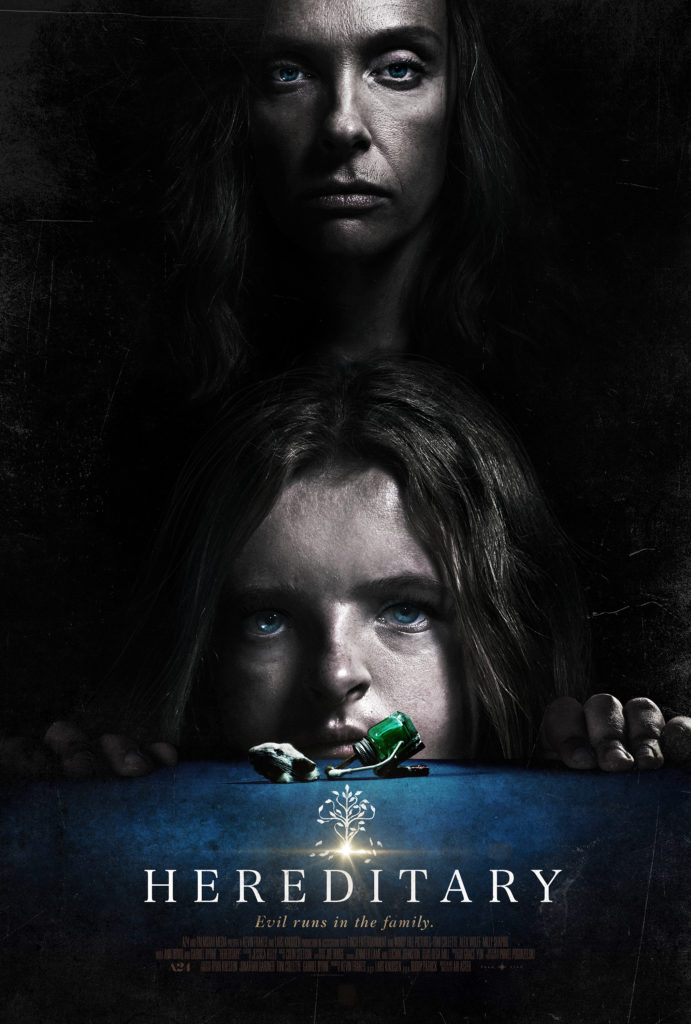
What follows contains major spoilers…
First-time writer/director Ari Aster has described his debut feature film, “Hereditary,” as a “family drama that dissolves into a nightmare.” Indeed, the “nightmare” it descends into is one of familial dysfunction, inherited trauma, grisly deaths, and ritual paganism.
But it’s the fated, inescapable draw of evil that most lingers in this tale of horror.
“Hereditary” is receiving a lot of favorable reviews, as well as being cited in many year-end “best-of” lists. The film’s arc begins with the passing of Ellen, the matriarch of the Graham family. As her daughter Annie’s family deals with their grief, they begin to unravel cryptic and increasingly terrifying secrets about their ancestry. The most sinister, we eventually learn, is not an inherited psychotic pathology (as the viewer is wont to believe), but a covenant with a pagan god named King Paimon. Annie’s son and daughter both become hosts for Paimon, per Ellen’s pact with his cult (and Annie’s reckless seances). The film is a slow descent into the family’s gruesome sacrifice for this possession, leading to the enshrinement of Paimon in his new residency. (For a fuller recap of the film’s weird, wild summation, read THIS.)
Interestingly enough (and perhaps this is part of my own discomfort with the film), King Paimon is not a fictional deity. Rather it has historical rootage. For example, the infamous occultist Aleister Crowley is alleged to have summoned the spirit. Paimon is described as a “desert spirit,” literally a “djinn” or genie. The Den of Geek expounded upon the mythology in The Real Story of King Paimon:
King Paimon is one of Lucifer’s most obedient devotees, rules 200 legions of angels, is connected to the tree of death and first appeared in an anonymously written grimoire from the mid-1600s called Lesser Key of Solomon.
Of course, “Hereditary” is not the first film to utilize real-world (?) entities or explore the intersection of contemporary culture with old world paganism. Such films have a perennial appeal (see: “The Ritual” and “Kill List“), with the original “Wicker Man” perched at the top of that totem. What “Hereditary” does rather effectively is to tether this external evil (a matriarchal pledge to a demon) with a sense of existential (even genetic!) destiny.
And that’s where, for me, the film veered into very dark, unbiblical terrain.
Some might argue that stories about demons, pagan cults, and ritual sacrifice are always dark, unbiblical terrain. Elsewhere, I have suggested that “horror is an eminently biblical genre and that …many horror tropes are indeed compatible with a biblical worldview. Employing the grotesque and horrific in our stories can be a powerful tool in expressing the true nature of reality and the afterlife, and awakening spiritual and moral sensibilities to the world around and beyond us.” So what disqualifies “Hereditary” from such redemptive themes, cautionary or otherwise, or spurring a possible “moral awakening” in its viewers? It is not in the gore or the demonic, but in the existential inevitability.
An article in The Schmooze tips us off to the worldview of the director, and this rather bleak spiritual dead end, noting a “lack of Christian imagery” in the film.
Several critics, including both Vox and Newsweek, have observed that some of the uniqueness of “Hereditary” derives from a lack of Christian imagery and its unusual approach to the Occult. Aster [the director] has an answer for that. “Maybe the lack of Christian iconography and stuff like that has something to do with the fact that I’m a Jewish guy,” he told Newsweek. And witchcraft? “Ultimately, I have no ties to the occult,” he said. “In any way. I’m just a Jewish guy. I’m just a neurotic Jewish guy.”
This lack of “Christian iconography” is not the norm in films about the occult. For example, the Christian faith of “The Wicker Man’s” protag is front and center. His spiritual impotence is the cautionary center of the film. Bibles, crucifixes, prayers, and holy water are fairly typical when one confronts cinematic devils and the devilish. However, apart from pagan sigils and ciphers, “Hereditary” has no traditional religious symbology.
Thus, no spiritual counter to King Paimon’s body slam.
While stories of despair and darkness can indeed be biblical, framing that despair and darkness in the context of Faith, Hope, and Love provides the necessary balance. Indeed, Evil may sometimes win. But the message of Scripture is that, at the least, there is a Way of escape.
Such a “way of escape” does not exist in “Hereditary.” In fact, the evil in Aster’s film is inescapable… even hereditary.
Pagan practices and cults are real. Demons exist. But the notion that our “heredity” predisposes us to evil or inevitable ends is a concept Scripture challenges. Our destinies are not written by the hands of our forefathers (or foremothers). Pacts with the devil may indeed be generationally tethered, but they are not binding. There’s One who transcends covenants with false gods and genies.
Sadly, such an option was not available for the souls in “Hereditary.”














Thanks for your insights (and review), Mike. A blessed 2019 to you and yours.
Man, I loved the hell out of this film. But I agree that something about it struck me as particularly unbiblical.